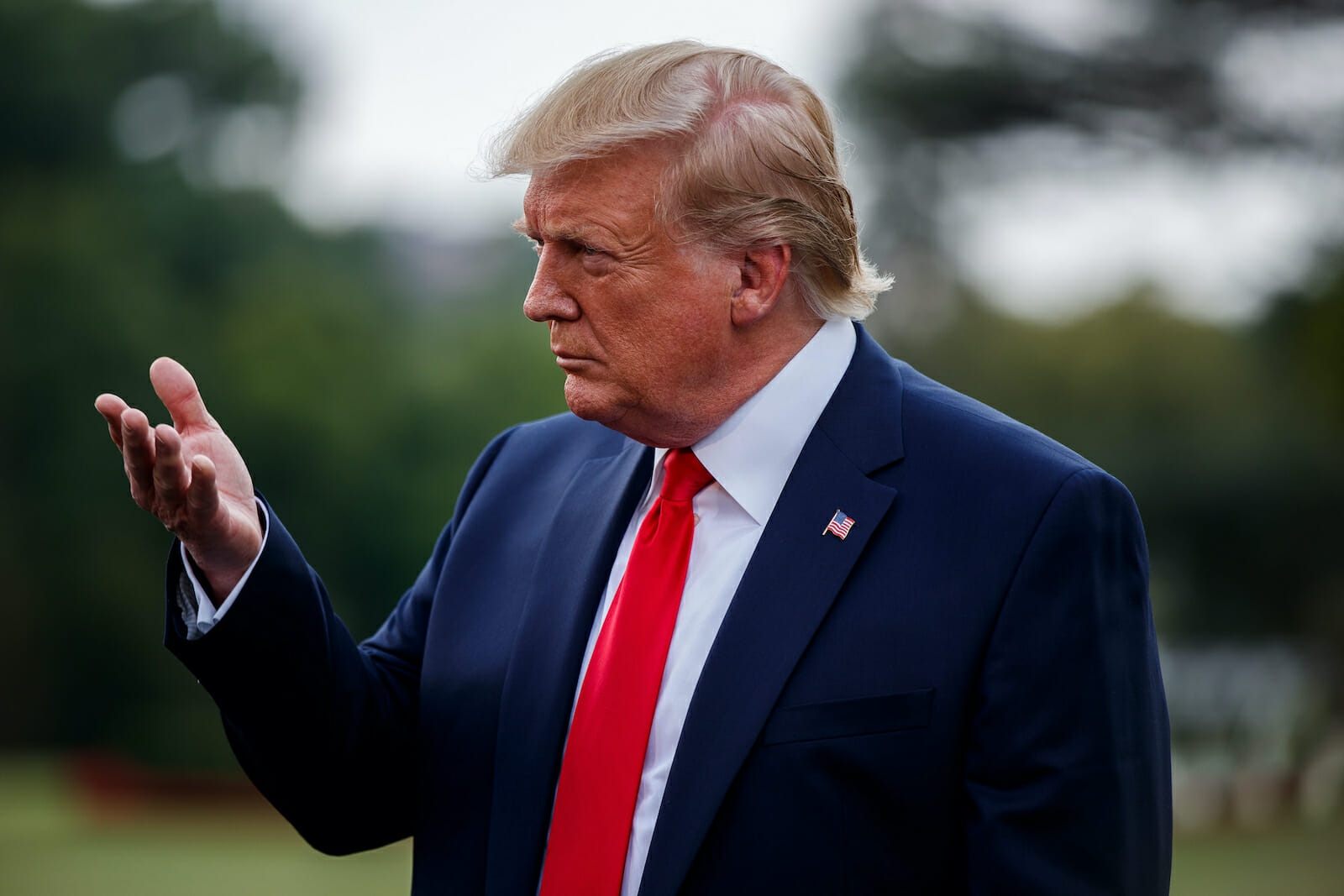
Reports of U.S. Iran ‘Debacle’ Appear to be Overblown
In the immediate aftermath of the killing by a U.S. drone of Maj. Gen. Qassem Soleimani – head of Iranian Revolutionary Guard’s Quds Force and the second most powerful member of Iran’s regime – a volley of acrimonious epithets and dire warnings was launched to condemn that action. “Reckless gamble” (CNN’s Peter Bergen), “provocative and disproportionate” (Speaker Nancy Pelosi) and “debacle” (Joe Biden) figured among the most salient characterizations of the episode.
Later on, when Iran’s regime resorted to a relatively-innocuous retaliation that looked very much like a mere face-saving exercise, criticisms became somewhat more measured and nuanced.
Thus, while reiterating that Trump’s Iran strategy was a failure, diehard anti-Trumper Max Boot (the son of Russian refugees, had written “I would sooner vote for Josef Stalin than I would vote for Donald Trump”) admitted that with the Soleimani strike, Trump may have registered a “tactical victory.” The Economist, for its part, pointed out that the Soleimani killing appeared to be “a gamble that has paid off in the short term.” The editorial board of The Washington Post asserted in turn that “proclaiming Trump victorious in Iran is shortsighted and premature.” Said in other words, Trump-provoked “debacle” is not imminent, but it will come anyway – or so they prognosticate.
It might be useful to spend some of the time left, before the prophesied debacle, to review the arguments advanced against the Soleimani strike so as to ascertain their validity – or lack thereof.
Those arguments fall within five broad categories.
Argument no. 1: Iran’s regime has not said its last word; further attacks against U.S. citizens, troops or assets should be expected – either by Iran’s forces directly or via its proxies.
That may well be the case. Trump’s critics, however, overlook a critical point: not reacting forcefully (as Trump did) to the invasion of the U.S. embassy in Baghdad would have emboldened Iran’s mullahs and induced them to orchestrate devastating attacks against the U.S. – if only to embarrass Donald Trump in this year of U.S. presidential elections and thereby undermine, and eventually destroy, his reelection chances.
After the Soleimani killing, however, the mullahs and their surrogates will think more than twice before launching murderous strikes. For they now know that they may individually become targets of reprisals ordered by the U.S. president. And none of them would like to follow Soleimani’s fate. That fear explains the mildness of the retaliatory attack launched by the mullahs after the killing of their comrade.
Add to this the fact that the drone attack that killed Qassem Soleimani also took away the life of Abu Mahdi al-Muhandis, the leader of Kata’ib Hezbollah, an Iraqi paramilitary organization allied to, and financed by, Tehran. Moreover, practically at the same time as the drone strike against Soleimani was underway, the U.S. had also targeted, though missed, a senior Iranian commander in Yemen. As a result, not only Tehran’s mullahs but also their proxies operating in Iraq and elsewhere in the Middle East will henceforth fret about what may happen to them should they embark on provocative moves against the U.S.
Make no mistake: the mullahs will hardly remain quiet in the period leading up to election day. They will for sure do their utmost to contribute to Trump’s eventual electoral defeat in November. Attacks against U.S. citizens, troops or allies, therefore, must not be ruled out. Be that as it may, the Soleimani killing is likely to have significantly mitigated the mullahs’ appetite for provocations.
Argument no. 2: Tensions between Iran and the U.S. would never have reached the present, perilous level had President Trump not pulled the U.S. (as he promised throughout the 2016 campaign) out of the nuclear deal negotiated and signed by former President Obama in 2015.
Here, too, nuancing is called for. That agreement yielded sizable benefits, at little or no cost, to the regime in place at Tehran. The UN sanctions regime against Iran was dismantled in exchange for a vague commitment by Tehran to abide by merely-temporary limits on the development of its nuclear weapons program. The verification regime stipulated by the deal, for its part, had multiple loopholes: contrary to what then-President Obama claimed, the inspection system provided by the deal covered only declared facilities, left aside military sites and did not authorize unfettered anytime-anywhere inspections.
Add to this the fact that the mullahs received a windfall of tens of billions – the amount of which is the subject of debate – that they have largely utilized to finance proxies and expand its influence in the entire Middle East.
Then-Secretary of State John Kerry admitted the perverted utilization of the funds retrieved by the mullahs thanks to the nuclear deal. In January 2016, he declared: “I think that some of it will end up in the hands of the IRGC or other entities, some of which are labeled terrorists.”
In the light of these considerations, it can be concluded that the benefits derived by the U.S. from the 2015 nuclear deal appear to be trivial as compared to the concessions it made to Tehran.
Argument no. 3: Soleimani killing will lead to the eviction of U.S. troops from Iraq. As a matter of fact, following the strike, Iraq’s parliament voted on a nonbinding resolution requesting the interim, caretaking government to proceed to that eviction.
This argument needs to be put in context.
Since President Obama brought U.S. troops back to the Iraqi battlefield, the U.S. military – and for that matter the coalition of Western powers – has been doing the bulk of the work fighting ISIS, thereby enabling Iran’s regime to concentrate efforts and assets on strengthening its grip over crucial sectors of Iraqi politics.
Thus, as asserted by Mario Loyola, a former foreign policy advisor at the Pentagon (and actually a critic of the Soleimani strike), the U.S. has, ever since former President Obama sent back U.S. troops to Iraq’s soil, “served as Iran’s proxy air force in Iran’s fight against ISIS, further helping to cement Iran’s regional hegemony.” Is that a role that the U.S. should be keen to preserve by maintaining its troops in Iraq?
This article does not intend to apportion responsibilities for the failure of U.S. Iraq policy. Some will arguably assert that the Iraq War declared by G.W. Bush should not have taken place at all; others will attribute the Iraq fiasco to Obama’s interruption of the Surge, led by Gen. Petraeus, at the time that initiative was yielding meaningful results. Whatever the original cause of that fiasco, the following assertion made by Steven Cook at the Council on Foreign Relations, neatly summarizes the predicament of the U.S. presence in that country: “Iraq is in a state of terminal collapse, and the United States is isolated and impotent there. It is thus hard to understand what Washington wants, and what the Americans who were left vulnerable to the likes of Soleimani are actually able to accomplish. The hard truth is that Iraq is lost, and it is time to leave.”
Argument no. 4: Trump’s maximum pressure against Iran has proven to be a failure (Jackson Diehl). Punitive economic sanctions and the Soleimani killing have not brought Iran’s regime to the negotiating table as hoped for by President Trump. What is more, Tehran has announced that it no longer feels bound by the 2015 nuclear deal and will cease to restrict uranium enrichment.
Tehran’s continuing intransigence, however, needs to be put in perspective.
There is no question that the mullahs will do their utmost – in the period preceding that election – to prevent Trump from boasting about a diplomatic breakthrough in Iran-U.S. relations. Things, however, could take a different turn afterwards.
Indeed, should Trump manage to win a second term, a safe bet is that the mullahs will be more responsive to Trump’s maximum-pressure track. As Tehran runs out of resources because of the U.S. sanctions, and as discontent grows among the population, Iran’s regime may have the existential need to secure a modus vivendi (an arrangement) with the U.S. and accept to negotiate a new nuclear deal.
A precedent of an Iranian policy turnaround exists. When Ronald Reagan won the presidential election in 1980, Tehran’s Ayatollahs sensed that the new U.S. president would be more assertive, and more aggressive, than the departing Jimmy Carter. They thus hurried to release, before Reagan concluded his inaugural address, the 52 U.S. nationals they had held hostages for 444 days.
In a similar fashion, should Trump be reelected in November this year, the mullahs will likely come to the conclusion that, unencumbered with electioneering restraints, Trump would feel freer to bring his maximum-pressure track against Iran’s regime to smothering levels. Under those circumstances, the Ayatollahs could be open to, and even seek, a negotiation with the Great Satan.
Democrats and anti-Trumpers are not neophytes in the art of issuing dire warnings on Trump’s stances. During the 2016 election campaign, economic pundit Paul Krugman announced that Trump’s economic policies would cause a global recession within 18 months; subsequently, Speaker Nancy Pelosi predicted an economic Armageddon. From what has been discussed in this article, the geopolitical “debacle” that Trump’s Iran strategy will assumedly bring about is likely to meet a fate similar to the economic Armageddon prophesied three years ago.
